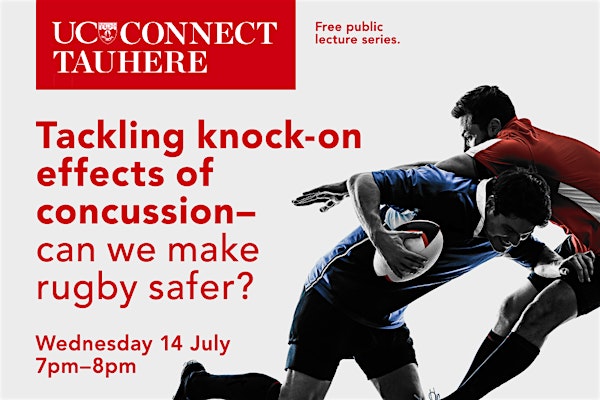
UC Connect public lecture – Tackling knock-on effects: protecting young rugby players’ brains
Presented by: Professor Nick DraperUC Connect public lecture - Tackling knock-on effects: protecting young rugby players’ brains University of Canterbury (UC) researchers are tackling the knock-on effects of playing rugby by engineering a better way to protect young players’ brains from concussion. Concussion is a recognised problem in contact sports like rugby. Researchers at the University of Canterbury are testing new forms of headgear especially targeted at helping young rugby players. UC Sports Science and Engineering researchers, in conjunction with industry, are testing whether safer protective headgear could make a difference. Spearheading the research is Professor Nick Draper, Sports Science of UC’s College of Education, Health and Human Development. He will be giving a free UC Connect public talk on 14 July about this research and the prototype headgear. A seasoned rugby coach, he has a particular interest in exploring whether head injury risks in junior rugby players could be reduced through wearing the right protective headgear. Also on the project is Professor Keith Alexander, of UC Mechanical Engineering and renowned inventor of the Springfree Trampoline, along with Mechanical Engineering lecturer Dr Natalia Kabaliuk. Professor Draper says of the research: “The recent class action brought by former rugby players in the UK has drawn media attention once again to the potential of collisions in contact sports to cause short-term and possible long-term health effects. Sport related concussion and head injuries are not only linked with contact sports, however, with incidences of concussion occurring from 0.4 – 46/1000 match hours, this health issue has to be a concern and focus for all involved in, or connected with, the game of rugby. “While rugby has many qualities that see it remain the national sport of New Zealand, there is a clear risk that players can sustain head injuries through collisions in the game. The focus of our research team – which includes expert clinicians, engineers, sport scientists and sports manufacturers in New Zealand, Australia, the US and UK – is on understanding collisions in contact sports more clearly, and exploring the potential of soft-shell headgear and coaching programmes to make the game safer for all players, but especially the juniors.” UC Connect: Tackling knock-on effects – can we make rugby safer? Presented by Professor Nick Draper, Sports Science, UC College of Education, Health and Human Development, from 7pm – 8pm, 14 July 2021– C1 lecture theatre in C-Block, Ilam campus, University of Canterbury, Christchurch. Register free to attend: https://www.canterbury.ac.nz/public-lectures/ For more information or to request an interview, please contact: Professor Nick Draper, Sports Science, UC College of Education, Health and Human Development nick.draper@canterbury.ac.nz, Phone: +6433693878 or UC Communications team, media@canterbury.ac.nz, Ph: (03) 369 3631 or 027 503 0168 Buy Tickets on Eventbrite // // More information UC EventsEmail: events@canterbury.ac.nz
Date and time
Location
C1 lecture theatre in C-Block
University of Canterbury Christchurch, Canterbury 8051 New ZealandAbout this event
Organized by
Founded in 1873, in Ōtautahi Christchurch, the University of Canterbury | Te Whare Wānanga o Waitaha (UC) has an international reputation for academic excellence in teaching and research.
People come first at the University of Canterbury, reflecting our intrinsic values: whanaungatanga, manaakitanga and tiakitanga. These values are rooted in trust, care and reciprocity, and were embedded over generations of Ngāi Tūāhuriri and Ngāi Tahu presence in the region. In fact, in 1861 Pita Te Hori, the first Upoko of Ngāi Tūāhuriri, instructed the founders of Ōtautahi: “kia atawhai ki te iwi – be kind to your people.” Today, these words underpin the relationships we foster amongst our students, staff and community. We are proud to open our doors to students and staff throughout Aotearoa New Zealand and the world, welcoming everyone to learn from one another and contribute to our diverse and flourishing community. The University of Canterbury is a place for everyone.
The university has an undivided focus on people, research, education and engagement to carry us forward to our 150th anniversary and beyond.
UC offers a unique, world-class learning experience that gives UC graduates a competitive edge in an increasingly challenging, dynamic and complex world – UC students graduate with the skills, knowledge and confidence they need to make a difference.
The University’s research-active lecturers and academics are committed to deploying their expertise and knowledge, and are active in partnering with others to advance civic purpose and foster public good.